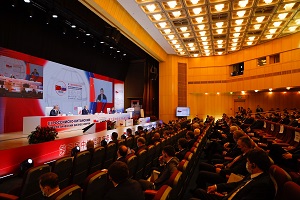Please activate JavaScript in your browser to use all interface options.
Igor Sechin Proposes that Russia and China Join Forces to Develop and Introduce Low-Carbon Technologies and Artificial Intelligence Systems in the Oil and Gas Industry
29 November 2021
The Russian Federation and the People’s Republic of China have strong low-carbon energy potential, and it would be advisable to consider joining forces to develop and introduce high-tech low-carbon technologies and artificial intelligence systems in the oil and gas sector, said Igor Sechin, Executive Secretary of the Commission for the President of the Russian Federation on the strategy of development of the fuel and energy industry and environmental safety, Chief Executive Officer of Rosneft Oil Company.
“Our countries have strong low-carbon energy potential and the production of hydrocarbons is also becoming more technology-intensive. In this regard, I believe it would be advisable to consider joining forces to develop and introduce high-tech low-carbon technologies and artificial intelligence systems in the oil and gas industry,” Igor Sechin said at the opening ceremony for the 3rd Russian-Chinese Energy Business Forum.
The Executive Secretary of the Presidential Commission on the fuel and energy industry expressed his conviction that, in the long term, energy would retain its key role in the Russia-China relationship, even amid a global shift in approaches to energy development, as Russian companies were increasing their focus on supplying consumers with green energy with a low carbon footprint, which was fully consistent with the long-term energy vision of both countries.
INFRASTRUCTURE AND LOGISTICS PROJECTS
Igor Sechin noted that the growing interconnectivity and complementarity of the world’s two major economies showed tremendous potential for the development of trade, economic and investment cooperation between the countries.
“Russia’s intensive development of infrastructure and large-scale logistics projects, such as the Northern Sea Route, the modernisation of the Baikal—Amur Mainline, the Power of Siberia gas pipeline and the Europe—China transport corridor, will give new impetus and strengthen our cooperation,” the head of Rosneft said. He believes that energy contacts between Russia and China are not limited to oil and gas.
“Our countries’ leaders have set targets to achieve carbon neutrality by 2060. In this regard, this May our leaders personally launched the construction of the new Tianwan and Xudabao NPP units, carried out jointly with the Russian company Rosatom. These are the largest Sino-Russian joint nuclear energy projects to date, reflecting the high level of Sino-Russian cooperation,” Igor Sechin said.
These projects not only contribute to achieving greenhouse gas emission reduction targets, but will also provide a solid foundation for optimising China’s energy sector.
Igor Sechin remarked that the state-of-the-art Generation 3+ reactors being built in China by Russian specialists were characterised by improved safety, reliability and capacity, a 60-year service life and high rate of unit capacity utilisation (90%), and the ability to operate for 18 months without refuelling.
“Our Chinese partners have shown great interest in the BN-800 fast-neutron reactor, which will be the basis for the final testing of this technology, leading to the eventual completion of the nuclear fuel cycle,” Igor Sechin said.
The head of Rosneft noted that China’s plans for the 14th Five-Year Plan (2021-2025) set new tasks for the nation to change the quality of economic growth, creating new formats of development.
“The Dual Circulation strategy, i.e. taking advantage of China’s huge domestic market while focusing on attracting foreign investment and developing international trade, will ensure that China maintains its leadership in global economic and technological development,” Igor Sechin explained.
Rosneft
Information Division
November 29, 2021

-315xx70.png)

